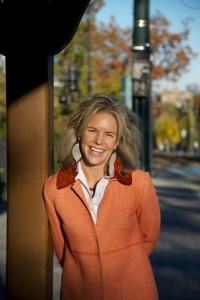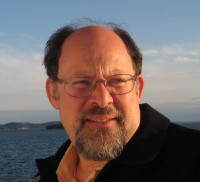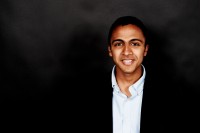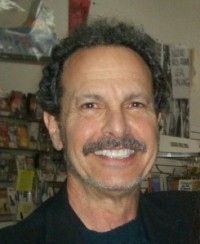
The following interview is shared with you by both Kirsten Olson and Isaac Graves. To learn about this interview series and reproduction, citation, and copyright information, please click here. To find out more about Kirsten Olson and her work, click here.
Kirsten Olson
 Isaac Graves: What does community mean to you?
Isaac Graves: What does community mean to you?
Kirsten Olson: Community is a group of people with whom I share values, aspirations, and understandings. Community are the folks who invite you to play, and take risks and also keep you in line and challenge you. Community for me happens in lots and lots different places, across many different domains of my life. The commonality is there’s a sense of play, and invitation, and sharing, and also of accountability and challenge in meaningful community to me.
IG: How does community play out in your life?
KO: I have many different communities, some of them are family community, spiritual community, many different work communities. In terms of educational work, some are transformational reform communities, some are practitioner problems-of-the-work communities, some are policy communities. One of the things I wish for is that there were more intersections between all these communities. In our sector we are so silo-ed and unaware of each other, in terms of our understandings of the work, our approaches to the work. So finding more commonalities and mutual understandings is something that I wish for and hope. At IDEA that’s the project that we are working on.
IG: What do you find most meaningful about community?
KO: Both a sense of being at home and also being invited to learn in them. I think a sense of hospitality in community is critical, and also the excitement of learning along with other people and exploring new ideas and solutions. That's very, very meaningful to me. I try to find that in all the communities that I’m in. Sometimes it’s harder than other others.
IG: What's missing in community?
KO: It would be easier for us to create real change in the sector if there were spaces for us to have reasoned conversations with each other about what we agree and disagree on. I wish there were more places that we met to exchange our ideas and learn, rather than to fight with other, or “other” each other, or mischaracterize each other. Fighting and othering is a stance lots of people are in and that is tremendously unproductive for us. People tend to feel very, very passionately about the transformation of education in ways that sometimes make it hard to hear other people whose point of views are really radically different. So an ideal community to me would be a place where people could come together to hear each other and to know each other more.
IG: What is an ideal community to you?
KO: Hmm, is it a virtual space? Yesterday I was talking to one of my friends who works at Education Trust, which is a policy think-tank in Washington, and then I had a conversation with someone who is at a Free School, in the same day, and a public school superintendent and emailed with my IDEA colleagues. Where are the places in our sector in which all those elements can get together and understand what parts of the project everyone is working on? Not that we all have to agree with each other, but understand what everybody else is doing and to try to hear about why they’re doing it with less passion and castigation and sense that "I know the best way" or "what you have to say has no meaning to me—you don’t operate in the same accountability world that I do." All those various ways that people “other” folks are unproductive. Of course there are real philosophical disagreements about how people learn, the conditions under which people should learn, and what the outcomes of education should be. But we don't have places that foster powerful discussions around those differences. It’s a pretty fragmented and un-cosmopolitan world.
So, how would I imagine this ideal community? I think we just have to start doing it. That’s the project that you are working on at your conference. So, the more we are producing folks who know about what’s going on in lots of different parts of this sector and can speak to each and are translators—the better. And the more places we have to come together to talk about things the better, too.
IG: What does a democratic education mean to you?
KO: Seven things describe democratic education to me. It means shared authority in the educational enterprise with the positional authority of adults mattering less than it does in conventional educational settings. It means real thinking, so that achievement is related to real outcomes, and assessment and evaluation is related to people’s work or thinking. The work students do is organized around student interests much more than it is in most conventional educational settings. There’s kind of negotiated content: students negotiate with whomever the educators are about what they are going to learn and how they are going to learn it and how it is going to be assessed. There’s a push in the enterprise to increasing independence in the learner and also interdependence—that learning requires both of those, and that both of those capacities really be nurtured and intensified. That rigor is increasingly defined by students: students can begin to own the process by which you make the work better and that that is deeply apart of the democratic enterprise; is it’s shifting authority for judgment of what good work is away from adults onto the learner, him or herself. And high achievement is available to all, that the purpose of school is not to sort and track kids but that there’s a mastery orientation to learning in which everyone can be successful and cognitive difference is welcome. And so my last piece is that difference is seen as sustaining and helpful. Intellectual, social, and cultural difference is seen as critical to the lifeblood of a healthy learning environment. What are the outcomes of these things? To me, much, much more powerful, engaged learning, more meaningful learning for everyone. Educational places that people actually want to be. That was comprehensive and wonky, wasn’t it?
I’m finding all these videos to try and demonstrate what I want to talk about. So I found this fabulous 1953 video about democratic classroom practices. It’s one of those "everything old is new again" pieces . . . we seem to be in the same conversation every four or five decades whether we wish to be or not. I realized that back in the day, in 1953, there was much more interest and receptivity to some of the fundamental principles of democratic education than there are now. The current No Child Left Behind and the kind of reform era that we’ve been since the early 80s have actually flattened the meaning of education. Attainment of skills and knowledge that will make us competitive in the global marketplace seems to be all that school is about in the conventional settings now. The idea that school was really about producing people who were engaged with the world and cared about the world as citizens was a much more acceptable set of ideas and attitudes in 1953 than it is now—which is astonishing considering the relatively repressive climate of the 1950s. It’s just really interesting.
IG: How does education play out in your life?
KO: Well, education is at the center of my life. And there’s two pieces to it: passionate learning myself. One of the things I love most about my life is that I can be in really, really fun learning projects with other people through my work. Whenever I am doing something with somebody, and we are trying to learn together about how to do the work better—I love that and find it incredibly exciting and enjoyable. Second, a lot of my work is about figuring out how to help kids who are stuck in stultifying, uninteresting institutions get to do some of the same kinds of fun learning projects that we as adults often get to do in our work. The schools I’m in, in most of my work days, have almost nothing to do with that kind of really passionate, joyful learning that is at the center of my work life. And so the starkness of that contrast is there for me all the time. Why would we do this to kids? What is our purpose in that? Ultimately, what will be the consequences of the particular regime that we are in now? So, that’s part of it—this alive, playing, incredibly fun part of learning has always been so much in contrast, for me all of my life, to this institution that we call school which seems to me to have almost nothing to do with that. There are places and things called school where that can happen, but the almost active disregard for the pleasure of learning—you know schools are really not institutions that are organized around pleasure. Pleasure is almost embargoed. The contrast of that really drives a lot of what I do.
IG: What do you find most meaningful about your work in education?
KO: I have been passionately consumed by the problem that I just named, which is the power and pleasure of learning in contrast to the institution in our culture that houses it, for a long time. I’ve been in that problem since I was maybe in the first grade and I am still learning lots of new things about it and finding new ways to understand that problem. I always say to my undergraduates when I ask them to write a paper about the purpose of education: "what you’re really writing about is: what constitutes a meaningful life? What do you think is really important to live for?" That is at the center of education. That's why the questions it involves are so profound and complex and important to wrestle with, even though we don’t do a very good job with wrestling with them. But they really are about: what do we want to live for? What do you think is meaningful? What is the nature of human life? How much control and authority do people need to learn things? What are the consequences of that control and authority? I find all of that really, really interesting. Then, how to take those big thoughts and make them practical—like what do you say in the faculty meeting tomorrow about the problems of this particular school that we’re working in.
IG: What's missing in education?
KO: There is tremendous under-appreciation of the complexity of learning, of the complexity of emotion, and cognition, and spiritual inclinations that learning involves. There’s way too little respect for learners themselves. Learners, for the most part, are treated like cattle on a feed-lot and at a factory farm—and schooling is a crushing spiritual enterprise. In many ways, deliberately so. The individuals who work in schools are often crushed individuals themselves. The failure to appreciate the complexity of the enterprise of learning is just profound and underlies so many things that are wrong with how we do school. I’m very much with John Taylor Gatto. I don’t think that’s a mistake. I don’t think these things are accidents. We have the system that we have for particular reasons. The issue is that that system has become dysfunctional and the new story has not been born yet.
IG: What is an ideal education to you?
KO: There is no ideal education. That is a mistaken idea because in terms of education, what is considered valuable and important is intimately connected and related to your community, and your social class, your ethnicity, your geography, your parent’s aspirations—what you think is meaningful really comes out of a particular context and education is about expressing that in some way. What I’m committed to is I think there needs to be more real and coherent choices for the millions of kids who are in school right now who have no choices. What I see is a monolithic educational system that is largely about control and lack of choice—and again I would say deliberately so. Our job is to create many, many more viable alternatives for communities and for students in lots of different kinds of ways. Right now, in spite of growing interest in different kinds of schools, they still largely don’t exist—choices don’t exist. Especially for people who are not high social capital, who live in isolating neighborhoods, urban and rural, there really aren’t choices. Greater consciousness about the effects of school—the ways in which conventional school flattens us, and devalues us, and cheapens us something that people are largely not conscious of. I think that a more ideal education would cherish this complexity and hold that as much more sacred.
IG: What do you think people should know about the relationship between community and education?
KO: We have moved from a world where your community was about where you lived, where you grew up, whom your ancestors were and are. Community now is be morphing into something that is much more global, much more boundary crossing, and in some ways much more self-created. That’s just one of the promises of the world that we live in now. So, that’s also a challenge to community. You know there’s a real tension there. But there are enormous possibilities for people to collaborative all around the world to produce educational environments for folks that we could never have created in the past. That is going to happen. I think that’s tremendously promising. I could now really conceivably work with my son in New Delhi and my colleague in Melbourne to try to create some kind of new educational model. And we could go pretty far in describing what that is, beginning to put the pieces of that together, making that meaningful and having other people know about it in ways that we really couldn’t before. I see that is very promising—hopeful. But the old institution of schooling cannot survive under these conditions. And I'm okay with that.


 Isaac Graves: What does community mean to you?
Isaac Graves: What does community mean to you?
 Isaac Graves: What does community mean to you?
Isaac Graves: What does community mean to you?
 Isaac Graves: What does community mean to you?
Isaac Graves: What does community mean to you?















